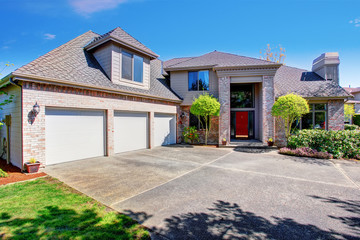While the initial cost of a concrete driveway may be higher than that of an asphalt driveway, the material is extremely durable and does not require a lot of maintenance. Adding a sealant to concrete can greatly improve the appearance of the driveway, making it a great investment that can return your initial investment over time. In addition to the durability of a concrete driveway, the material can also add a lot of curb appeal to your home. And it lasts for 50 years or more! 
If you want a smooth concrete driveway, you’ll need to prepare the ground. You should make sure the area is level and free of weeds. After compiling the soil, you can use a rammer or vibratory plate compactor to flatten the area. You’ll need to be sure the shape of the driveway matches your plan, as a shoddy layout could mean you end up ordering too much or too little concrete. Once the slab is flat, it’s time to prepare the forms. Place these forms in the desired locations and secure them with stakes every three feet. If your driveway is not completely level, use the excess concrete to fill in any shallow areas.
To prepare the ground for a concrete driveway, it’s important to use the stable ground. Soils that shift are more likely to crack than ones that are level. Another factor to consider is trees. Big trees have creeping roots that can push up on a driveway’s foundation. As a result, the concrete can crack. Also, be sure not to plant trees that may affect the driveway. Some trees are particularly problematic – the roots can grow upward, pushing the driveway up and cracking it.
If your driveway is heavy-duty, it’s advisable to install a reinforced concrete slab. While plain concrete is the most popular material for driveways, reinforced concrete has better strength and stability. It’s the ideal choice for areas of heavy traffic. Although reinforced concrete doesn’t prevent cracks, rebars can help hold the concrete together and prevent cracks from spreading. Reinforced concrete can be laid in a grid or wire-mesh pattern. Some homeowners also place blocks under the rebars.
A good way to estimate the price of a concrete driveway is to draw a layout drawing and measure the length of your driveway. Multiply the length by the width and depth and divide the result by 27 to find the cost per square foot. Add 10% for errors. Also, don’t forget to include any additional materials, including gravel for the base, fabric underlayment, installation labor, rebar or mesh wire, and permits. These can add up quickly, so you can expect your driveway to last for many years.
When ordering a concrete driveway, ensure that you use the right mix. Some types may require more water, while others may not. If the mixture is too thick, you might want to consider replacing the driveway with an asphalt one. But remember that the base layer should be gravel to keep the concrete from settling. Choosing the right concrete mix is essential for the durability of your driveway. And remember to check the thickness of the concrete slab before ordering it.
While an asphalt or composite driveway is durable, the soil underneath can cause cracks. Organic soil is great for gardening, but it is not good for supporting concrete. The soil expands and contracts, providing poor support. A sand and gravel mix will drain well and compact, and solid rock, like limestone, will provide excellent support for a driveway. Granular soils are composed of sand, clay, and other materials. If you’re planning to install a concrete driveway, check out these tips to protect it for years to come.
When choosing a concrete driveway, it is important to remember that every municipality has its specifications, and your locality will affect the cost. Then, you need to consider the drainage requirements in your area and whether it is possible to use a power washer. If you live in a drier area, it is highly recommended that you call a professional concrete driveway company. The cost of a concrete driveway depends on how far you live from the supplier.
The cost of a concrete driveway depends on several factors, including the design, the materials, and the labor costs. Laborers will prepare the site and build concrete forms. They will also add rebar, if necessary. Once the concrete has cured, the forms are removed. The final cost is between $3 and $10 per square foot. The cost of a concrete driveway varies greatly, but an average driveway will cost anywhere from $400 to $4,000, depending on its size and complexity.

